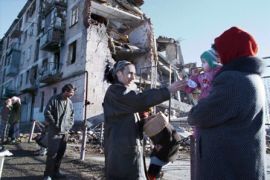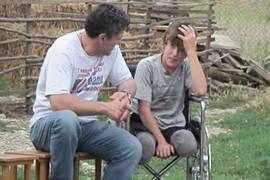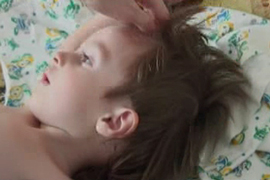
Lost Children of Chechnya
A doctor returns to his war-torn country to help children maimed by landmines.
Filmmaker: Tim Tate
Over 12 years the Russian army fought two brutal wars in Chechnya, leaving it as United Nations estimate, one of the most heavily land-mined countries on earth.
More than 250,000 civilians were killed – a quarter of the country’s population.
Thousands of children have died or lost their limbs after stepping on land mines or picking up unexploded ordnance or homemade bombs disguised as toys, videotapes or cigarette lighters, according to relief agencies.
 |
Chechen surgeon Khassan Baiev has put his own life at risk by returning to Grozny to help a generation of children damaged by this terrible legacy.
He works with seriously injured children and even though the conflict has now officially ended, thousands of unmapped landmines still kill or maim them every year.
And there is a disturbingly high incidence of birth defects, rates of which have grown dramatically since the wars.
The causes are not entirely clear, but one key factor may be mental trauma caused by the stress of years of war.
In 2002, the Chechen Ministry of Health reported 5,695 landmine and unexploded ordnance casualties, among them 938 children.
Children have also disappeared as a result of zachistki (anti-guerrilla special operations) carried out by Russian forces, claims Oleg Gaba, the official in Chechnya’s pro-Moscow administration responsible for monitoring children’s rights.
Most of Chechnya’s 500,000 children do not know life without war. Some were in their formative years when they hid in basements, forced to play indoors.
Counsellors who now work with them in schools said the children were depressed, have a hard time communicating and sadly, many of their first toys were guns.
 |
Eight out of 10 children suffer from psychological or nervous disorders, a study by the republic’s health ministry last November showed.
“There is not a single child in Chechnya who hasn’t been traumatised,” says Yakha Shvarts, one of about 30 psychologists working with children in the devastated republic.
“Most children have lost a parent or a sibling,” she said. “They saw people die. They have fears. They have nightmares. They are afraid when they see or hear tanks. The process of healing is very slow.”
Russia’s campaign to rule the breakaway republic has lasted since 1994. During these years Baiev risked his own safety to perform thousands of life-saving operations.
Now a political refugee in the US, he went back to Grozny recently on a mission to rebuild the bodies and the lives of the generation he calls “the lost children of Chechnya”.
Filmmaker Tim Tate accompanied Baiev, to record his struggle to care for the children with only the most basic of resources.
His film is extraordinarily moving, but contains some harrowing images of injuries and operations.
It portrays a brave doctor struggling with his professional and human consciousness and coming to terms with the heroic acts he performed and now is able to see them as saviors of children lives.
He returns to Chechnya to offer even more help to the young.
Lost Children of Chechnya can be seen from Thursday, June 4 at the following times GMT: Thursday: 0830 and 1900; Friday: 0330, 1400 and 2330.